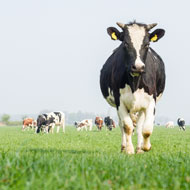Culicoides genome to boost knowledge of livestock viruses

“For the midge community this is an exciting moment and our work will assist those around the world who carry out research on these tiny flies."
Scientists have sequenced the biting midge genome, paving the way for better control of these insects, which transmit a range of important viruses on UK farms, including bluetongue.
Researchers from the Pirbright Institute and the European Bioinformatics Institute generated and built the complete Culicoides biting midge genome.
The research has been published in BMC Genomics and the whole genome will be made available from the open access system, Ensembl Genomes, from December 2018.
Lead author Dr Mark Fife said: “Providing the biting midge genome enables scientists to work out where important genes are located and in some cases what their functions are.
“This will improve knowledge about which genes are involved in the transmission of livestock viruses and also allows comparisons to be drawn with other groups of vectors, including mosquitoes and sandflies.
“This is important because division between biting midges and mosquitoes is likely to have occurred over 200 million years ago, meaning that they differ substantially in their genetics.”
The genome will also help with genetic manipulation, including the production of transgenic lines - a technique that is already routinely applied in a large number of research areas with mosquitos. These include studies on how they find their hosts, why certain individuals get infected by viruses and others don’t, as well as in producing sterile insects for the purposes of control.
Dr Simon Carpenter, who leads the Entomology group at Pirbright, said: “For the midge community this is an exciting moment and our work will assist those around the world who carry out research on these tiny flies.
“One of the difficulties that we face as researchers on this vector group is that there are major challenges in working with such small insects - providing basic resources like this for what are a neglected species is therefore a major accomplishment.”



 The RCVS has announced a new version of its 1CPD mobile app, with enhanced features for veterinary surgeons and veterinary nurses to record their continuing professional development.
The RCVS has announced a new version of its 1CPD mobile app, with enhanced features for veterinary surgeons and veterinary nurses to record their continuing professional development.